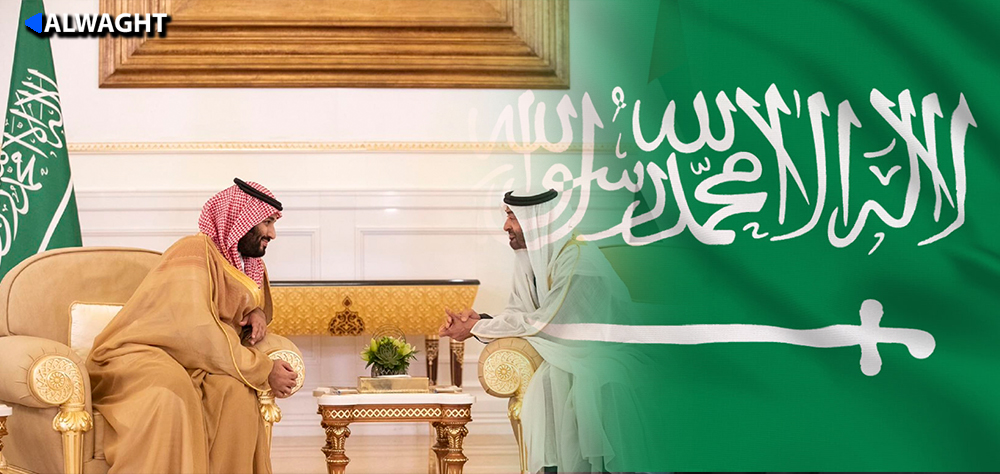Alwaght- UAE de facto leader Mohammed bin Zayed visited Saudi Arabia and met with the kingdom’s Crown Prince Mohammed bin Salman as the clouds of tensions are overshadowing their relations. But what is the nature of their fresh differences and how likely this trip will solve them?
Current tensions are just tip of the iceberg
The Emirati-Saudi tensions were glaringly apparent in their recent differences over output level of the OPEC Plus that consists of OPEC members plus non-member oil producers.
The UAE has always been a supporter of the Saudi stances in the OPEC Plus. For example, when Saudi Arabia, along with Russia, agreed to cut production, the UAE fully backed the decision. However, their views have been conflicting lately. Saudi Arabia is a big OPEC oil supplier and low oil prices have caused troubles for its economy and budget. The UAE, which has focused on increased output in recent years with exit from the oil bloc, shows it wants to walk its own way and end the decisive relationship with Riyadh.
In retaliation to the UAE behavior, Riyadh has imposed a ban on the Emirati citizens' entry to Saudi Arabia in a show of deterioration of the relations.
The Saudi-Emirati crisis aspects transcend the OPEC tensions and the current controversy is just the tip of the iceberg.
Egypt and Saudi Arabia have been seen in the past decades as prominent Arab countries playing a role in the developments in the Arab world, with Riyadh being the financial hub of the Arab world and Egypt its military hub. But in the last two decades, the emergence of the UAE as a new economic power in the (Persian) Gulf Cooperation Council has begun to change that equation.
Under bin Zayed, Abu Dhabi was no longer a silent spectator of the regional cases and conflicts. Using its political and financial partners in the West to strengthen its influence throughout the region, the UAE has actively intervened in various regional cases from Egypt to Libya and Yemen. The recent OPEC crisis made it clear that the UAE would no longer operate under Riyadh supervision, rendering the Saudis angry.
Bin Salman waged Yemen war after recommendations from the UAE counterpart. But the failure of the war and emergence of rivalry between the two in Yemen pushed Mohammed bin Salman to adopt a new approach under which Abu Dhabi power gain in West Asia and North Africa was regarded against Riyadh interests.
The first major differences emerged in the Yemeni war. While the UAE controls some border areas, relying on the support of proxy forces known as the Southern Transitional Council (STC) and has in fact occupied some strategic areas of Yemen such as Socotra Island and Bab al-Mandeb Strait, Riyadh no longer controls even one percent of Yemen territory.
The UAE controls the entry of each ship into the Red Sea due to its military base on both sides of the Red Sea, namely in Djibouti and Bab al-Mandeb. This has tarnished the prestige of the Saudis— who once considered Yemen their backyard— in the region and the Arab world.
Another divisive issue in their relations is their competition for deeper influence in the West. Following the scandal of Jamal Khashoggi assassination in 2018, the UAE has shown that it has more influence in the Western world and has better relations with China, too. In contrast, Riyadh has launched a political campaign across the Western countries to prevent some European countries, such as Germany and Italy, from supplying arms to the UAE. According to media reports in January this year, Italy announced that it would suspend arms sales to the UAE and Saudi Arabia because of the war in Yemen and its aftermaths. But in the meantime, some Western sources believe that the suspension was more against the UAE than against Saudi Arabia. Following Rome's decision, while Riyadh showed self-restraint, Abu Dhabi expelled Italian air force personnel from one of UAE military bases.
Another difference point between the two is the reconciliation between Riyadh and Muslim Brotherhood sponsors in the region Turkey and Qatar. Riyadh moved closer to Ankara and Doha in a bid to solve its regional challenges, but Abu Dhabi is angry with this policy.
Definitely, bin Salman wants to restrict bin Zayed power in the region. Even the UAE-Israeli normalization, which was granted Saudi green light through Bahrain, is not out of the orbit of anti-Emirati measures of bin Salman. While the UAE sought to strengthen its influence in the region by normalizing relations with Tel Aviv, this has now become a tool in Bin Salman's possession to push Abu Dhabi back. According to some Kuwaiti sources, the Saudis have decided not to allow Israeli planes to fly in their airspace anymore.
Moreover, in recent months there has been a massive secret war between the two countries' intelligence and security agencies on the social media. Both control and fund fake accounts on social platforms. A 2019 internal Twitter probe revealed that a majority of the "fake and bot accounts" on this social network were originated in Saudi Arabia and the UAE. Publication of fake news against the leaders of the two countries has been one of the actions of these accounts in recent months to influence public opinion. Emirati users, for example, published fake news about the ban on the call to prayer, or adhan in Arabic, in Saudi mosques on the orders of bin Salman.
As the two Arab countries see their differences over an array of regional and international cases intensifying, they increasingly consider each other security threats.



























